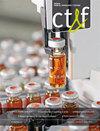Simulation of thermochemical processes in Aspen Plus as a tool for biorefinery analysis
IF 0.5
4区 工程技术
Q4 ENERGY & FUELS
引用次数: 0
Abstract
The development of tools for the synthesis, design, and optimization of biorefineries requires deep knowledge of the thermochemical processes involved in these schemes. For this project, three models from scientific literature were implemented to simulate the processes: fast pyrolysis in a fluidized bed, fixed-bed, and fluidized-bed gasification using the Aspen PlusTM software. These models allow the user to obtain performance, consumption, and cost parameters necessary for the design and optimization of biorefineries schemes. The fast pyrolysis model encompasses a detailed description of biomass decomposition and kinetics of the process (149 reactions). In the fixed-bed gasification process, seven reactions that model the process have been integrated into two equilibrium reactors that minimize the Gibbs free energy. The model used for fluidized bed gasification considers both hydrodynamic and kinetic parameters, as well as a kinetic model that considers the change in the combustion reaction rate of biomass with oxygen leading to a change in temperature. Due to the complexity and detail of all these models, it was necessary to use FORTRAN subroutines and iterative Excel macros linked to Aspen PlusTM. Finally, the results of each simulation were validated with data from the model sources, as well as experimental results from the literature.在Aspen Plus中模拟热化学过程作为生物炼制分析的工具
开发用于合成、设计和优化生物精炼厂的工具需要对这些方案中涉及的热化学过程有深入的了解。在本项目中,使用Aspen PlusTM软件,采用科学文献中的三个模型来模拟过程:流化床快速热解、固定床和流化床气化。这些模型允许用户获得设计和优化生物炼制方案所需的性能、消耗和成本参数。快速热解模型包含了对生物质分解和过程动力学(149个反应)的详细描述。在固定床气化过程中,七个模拟该过程的反应被整合到两个使吉布斯自由能最小的平衡反应器中。流化床气化模型考虑了流体动力学参数和动力学参数,同时考虑了生物质与氧的燃烧反应速率变化导致温度变化的动力学模型。由于所有这些模型的复杂性和细节,有必要使用FORTRAN子程序和链接到Aspen PlusTM的迭代Excel宏。最后,利用模型来源的数据和文献中的实验结果对每个模拟结果进行验证。
本文章由计算机程序翻译,如有差异,请以英文原文为准。
求助全文
约1分钟内获得全文
求助全文
来源期刊

Ct&f-Ciencia Tecnologia Y Futuro
Energy-General Energy
CiteScore
1.50
自引率
0.00%
发文量
7
审稿时长
>12 weeks
期刊介绍:
The objective of CT&F is to publish the achievements of scientific research and technological developments of Ecopetrol S.A. and the research of other institutions in the field of oil, gas and alternative energy sources.
CT&F welcomes original, novel and high-impact contributions from all the fields in the oil and gas industry like: Acquisition and Exploration technologies, Basins characterization and modeling, Petroleum geology, Reservoir modeling, Enhanced Oil Recovery Technologies, Unconventional resources, Petroleum refining, Petrochemistry, Upgrading technologies, Technologies for fuels quality, Process modeling, and optimization, Supply chain optimization, Biofuels, Renewable energies.
 求助内容:
求助内容: 应助结果提醒方式:
应助结果提醒方式:


